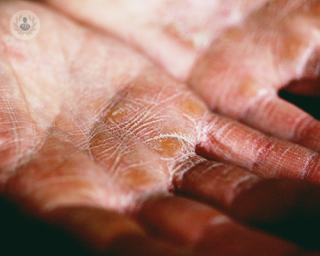Atopic dermatitis
Dr Kapil Bhargava - Dermatology
Created on: 10-19-2015
Updated on: 09-20-2023
Edited by: Carlota Pano
What is atopic dermatitis?
Atopic dermatitis (or atopic eczema) is a chronic inflammation of the skin that results in an itchy rash. It is more common in children than adults.
This condition is “atopic” because it does not affect a specific area; it can affect several different areas of the body and is not necessarily where the skin is in direct contact with an allergen.

Prognosis
Atopic dermatitis is a long-term condition. There is no decisive cure as of yet, however, with adequate treatment, the symptoms can be controlled.
In some cases, the condition goes away on its own during puberty. If the condition becomes chronic - that is, you still suffer from it when you are an adult, its symptoms may become more severe with time.
What are the symptoms of atopic dermatitis?
When atopic dermatitis starts showing its first symptoms, a child may have:
- dry skin
- erythema (a redness of the skin), blisters, crusting, and eczema on the skin
If the condition becomes chronic in adults, the symptoms will be more severe and you may also suffer from:
- hyperkeratosis (thickening of the skin)
- papules (skin lesions) on the skin
- intense itching
- anal fissures, sometimes with blood
- increased sensitivity to skin infections
How is it diagnosed?
A dermatologist will analyse your rashes with:
- A physical examination
- A patch test (some allergens are placed on your skin to see if there is a reaction to them)
- A biopsy (in rarer cases, this is done to exclude other potential, more severe conditions related to atopic dermatitis)
- An allergen-specific immunoglobulin E (IgE) test
- Skin-prick testing
- Screening tests for breathing problems, such as asthma, rhinitis, and rhino-conjunctivitis, which may lead to developing atopic dermatitis
What causes atopic dermatitis?
Atopic dermatitis is a multi-causal disease, that is, a condition caused by several concurrent factors. The most common causes include:
- Genetic predisposition
- An anomaly in the activity of the enzymes that make the natural hydro-lipid film which protects the skin
- Stress
- Exposure to allergens or irritants
- Sweating
How can atopic dermatitis be prevented?
It is rather hard to prevent atopic dermatitis. However, you can prevent it from becoming chronic in children and you can take a number of steps to reduce its symptoms (however severe it may be and regardless of your age).
These measures include:
- Choosing delicate products for washing and taking care of your skin
- Wearing loose clothes, made of cotton, linen or other natural fibres
- Being very careful when choosing cosmetics and make-up, making sure they are allergen- and fragrance-free
How is atopic dermatitis treated?
Your dermatologist may prescribe:
- Topical corticosteroids
- Emollient creams or ointments, which can help with ongoing rashes
- Antihistamines, antibiotics or antiviral medications
- Phototherapy (if it could help you)
Many of these treatments will help in reducing the symptoms, however, adults with chronic atopic dermatitis will probably never cure it completely.
Which doctor should I talk to?
To diagnose and treat this condition, you will need to see a dermatologist.













